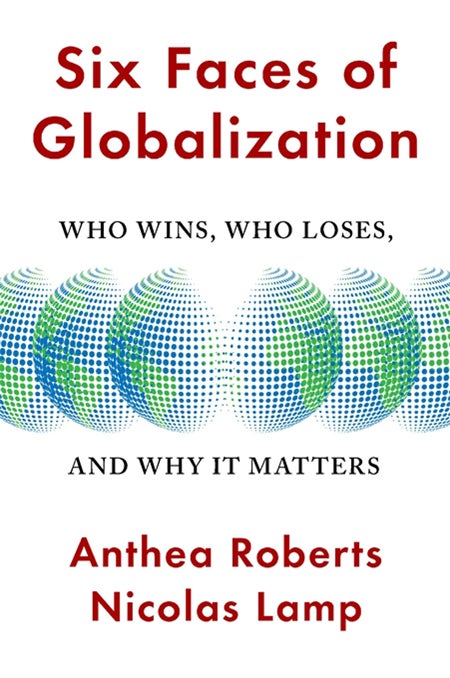In “Six Faces of Globalization: Who Wins, Who Loses and Why It Matters,” authors Anthea Roberts and Nicolas Lamp liken the debate on globalization to a Rubik’s cube. They outline six of the major narratives for and against the economic phenomenon, and show how those arguments can be combined and rotated to accommodate different sides of the political spectrum.
During an online book talk co-sponsored by the Harvard Law School Library, International Legal Studies, and East Asian Legal Studies, a distinguished panel took their turns on the metaphorical “cube” to critique the book and different aspects of globalization’s discontents, followed by responses from the two authors.
Oren Cass ’12, current executive director of American Compass, called on his experience directing Mitt Romney’s 2012 campaign to examine how arguments about globalization shifted between the 2012 and 2016 presidential elections. He cited two examples — “one that I’m proud of, one that I’m not so proud of”— to illustrate the change in attitudes.

Romney, he said, was one of the first to suggest that free trade with China wasn’t working — a view that wasn’t embraced by most economists (or by Donald Trump) until David Autor’s research paper “The China Shock” appeared in 2016. “People had to acknowledge what had been obvious to people who actually lived in America, that something had gone wrong here.” His second example was the opioid epidemic, about which he and his candidate were slow on the uptake. While opioids are now recognized as one of the darker consequences of international trade, he admitted that, “We would get questions about opioids in 2012. And I have to confess that I literally had to Google it.”
As a conservative, Cass did take issue with the book’s assumption that opposition to globalization comes mainly from the left side of the “cube.” He said, “The folks on the right of center who’ve said that we need to rethink globalization — they’re very frustrated by the extent to which it appears to have redistributed wealth away from the American working and middle class; they’re increasingly happy to be critical of the way it has distributed wealth upward, and they’re increasingly eager to criticize multinational corporations.” Whereas, he said, a Bernie Sanders is more likely to be in favor of open borders and wealth redistribution. “That actually sounds a lot like the globalists.”
Reading the book caused Harvard Law School Professor Ruth Okediji LL.M. ’91 S.J.D. ’96 to flash back to her own studies with William Alford ’77, the Jerome A. and Joan L. Cohen Professor of Law at HLS and the panel’s moderator. At the time, she said, the country was embracing the ‘newfound religion’ of globalism. “We all believed that globalization would flatten our differences, it would propel us not only to better material conditions, but that we would be better people. That somehow, money was the solution,” she said. Concurring with the authors, she said that this theory proved to have some major holes in it.

“The book reveals so poignantly the system itself being unable to extricate from any of these narratives,” Okediji said. “When we think about free trade, we don’t think about it from the lens of the colonial experience, or the ongoing effects of colonialism. We don’t think about free trade theory or its benefits from the perspective of minimum wage earners and those who are unschooled — in fact, rates of illiteracy in many parts of the world [are] going up. And we don’t think about free trade from the perspective of those who adhere very fundamentally to a core set of religious beliefs. So, there’s a whole swath of important historical and current perspectives and codes that underscore and, in some ways, pull away from [the book’s] six narratives.”
Anne-Marie Slaughter ’85, CEO of the New America think tank, referred to an op-ed that she published in The New York Times this month in which she argued that President Joe Biden needs to work with, rather than compete against, other nations, notably China, on policies that benefit all citizens, rather than competing with those nations. She cited climate change and the Global Vaccine Cooperation Action Initiative, proposed by Chinese President Xi Jinping last month and not yet adopted by the United States, as opportunities for a “people-centered” approach.
Responding to the panelists, author Anthea Roberts said that the idea of being “people-centered” also has a psychological component, as people on the political right and left tend to identify with different sizes of community: Those on the left tend to envision a global community, while those on the right are geared toward “smaller centers of concern or care” — family and immediate community before country. “That’s part of what you see with the right-wing protectionist narrative of cultural values and wanting to keep the integrity of a particular country; it’s also part of what you see underlying the geoeconomic narrative.” Responding specifically to Slaughter’s comments, Roberts added, “Your framing about people and the planet is about not just global threats but global opportunities, and that’s really a wonderful one.”
Her co-author, Nicolas Lamp, said that he hoped a future author could make a synthesis of the different narratives offered in the book. “Focusing on the narratives was something that we thought we could contribute to the debate, to provide this map and provide the ground for others to take it. Maybe we could make a small contribution to that, to designing a trade policy that would be responsive to the different concerns prompted by these narratives.”
